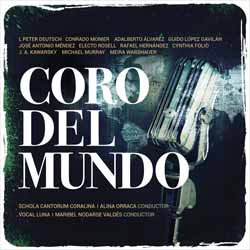|
Click here to return to the main site. Classical Music Review
Continuing in the series of Cuban recorded Ansonica Records projects comes Coro Del Mundo - choir of the world. With tracks ranging from sacred to secular, and from delicate to aggressive, the surprising cohesiveness of the composers’ work is astonishingly beautiful and impassioned. Schola Cantorum Coralina and Vocal Luna contribute exquisite vocals to the proceedings... Coro Del Mundo is a wonderfully diverse and intricate choral work by numerous composers. The interesting aspect here is that even though each composer's work is different from the other tracks on the album, it works as one wonderful work of art, flowing naturally. L Peter Deutsch’s 'Dance to the Revolution' opens the recording and takes inspiration from the writing of Emma Goldman. Goldman was one of the seminal writers and activists in the development of early-20th-century anarchist thought. Deutch’s 'Where Everything is Music' transports us to Havana. The lyrics for which are excerpted from a poem by Rumi, the 13th-century Persian poet and mystic, in the classic and well-loved translation by Coleman Barks. Cuban composer and conductor Guido López-Gavilán’s 'Qué Rico É!' is a shimmering choral mambo. J.A. Kawarsky’s 'Sacred Rights, Sacred Song', a multi-movement piece, envisions Israel as a healthy Jewish democracy in which the spiritual civil rights of all Jews are protected; Judaism is expressed and celebrated freely and equally by men and women and in its myriad forms of observance; and matters of personal status and spirit are governed by a public Jewish Law that welcomes vibrancy and creativity. Michael Murray’s 'El Lunar (The Mole)', based on a poem by Juan Clemente Zenea, depicts the adoration of a beautiful woman. 'Caminando (Walking)', based Nicolás Guillén’s poem focuses on the extreme poverty and scarcity faced by many Cubans in the 1930’s. The extraordinary desperation and bleakness Guillén depicts is emphasized by the implication of cannibalism toward the end of the piece. 7 Meira Warshauer’s 'We Are Dreamers' is an adaptation of the Jewish psalm 'Shir Hamalot (A Song of Ascents)'. In ancient times, the Shir Hamalot was sung as Jews walked into Jerusalem for festival holidays. Today it is most commonly chanted as part of the Birkat Hamazon (Grace After Meals) on Shabbat. While I found the entire album profoundly moving, I have to single out 'We Are Dreamers' as particularly noteworthy. With it's otherworldly delivery this rounds the album off beautifully. 9 Darren Rea Buy this item online
|
|---|


